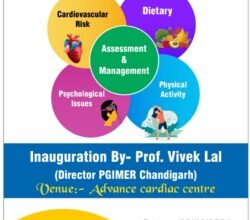Emergence of Omicron Variant of COVID-19

Emergence of Omicron Variant of COVID-19
The emergence of Omicron (B.1.1.529), a new variant of concern of SARS-CoV-2, has attracted worldwide attention. This variant is believed to have originated in South Africa in an immune-compromised patient. Since then it has been detected in Botswana, Belgium, Hong Kong, Israel and some European countries. It is characterized by multiple mutations in the spike and nucleocapsid proteins which outnumber the mutations seen in the Delta variant. The spike protein is the key protein that binds with human receptors to gain entry into cells.
With regard to this new strain, there is still uncertainty related to transmissibility, immune escape potential (from infection and vaccine-induced immunity), severity of disease and response to available countermeasures (e.g. diagnostics, vaccines, therapeutics). At present, there is no evidence of importation and transmission of the Omicron in the Indian subcontinent. However, given its immune escape potential and possible transmissibility advantage as compared to Delta (as indicated by the rapid surge in South Africa), likelihood of potential introduction and subsequent transmission of Omicron is high and we need to be on the alert.
Prof Mini P Singh, Professor and Nodal Officer, COVID-19 Testing at PGIMER, informed that the existing diagnostic tests (including the real time PCR as well as rapid antigen tests) can pick up this new variant.
The Union Ministry for Health & Family Welfare has revised its guidelines for international travelers which will be effective from 1st December, 2021. As per these guidelines, travelers from ‘countries at risk’ (including South Africa, Brazil, Bangladesh, Botswana, China, Mauritius, New Zealand, Zimbabwe, Singapore, Hong Kong, Israel and countries in Europe including United Kingdom) will need to undergo real time PCR on arrival and wait for results at the airport. If tested negative, they will follow home quarantine for 7 days. They will be re tested on 8th day, and if negative, further self-monitor their health for 7 days.
Travelers from countries other than those ‘at risk’ will be allowed to leave the airport but should self-monitor their health for 14 days. A small proportion (approximately 5% of the total incoming passengers) will undergo random post arrival testing at the airport on arrival. The samples from international travelers testing positive will be sent for genome sequencing to the Indian SARS-COV-2 Genomics Consortium (INSACOG) which is a consortium of 28 National Laboratories to study and monitor genome sequencing of COVID-19.
Residents in the tricity are advised to continue following COVID appropriate behavior (i.e. masking, social distancing, hand hygiene) and ensure vaccination of all eligible individuals. Mass gatherings and non-essential travel should be strictly avoided. Patients with respiratory symptoms should get themselves tested for COVID-19 and isolate themselves till the reports are available. Dr PVM Lakshmi, Professor, Community Medicine & School of Public Health, highlighted that enhanced surveillance will be important to detect the early warning signs and prompt initiation of public health and social measures.
There is no need to panic as, so far, no case of this new variant has been reported in India. As per instructions of the Government of India, ‘Test-Track-Treat-Vaccinate-COVID appropriate behavior’ should continue to be followed.
Prof Mini P Singh Prof PVM Lakshmi,
Coordinator, COVID-19 mentoring Nodal Officer, IDSP,
PGIMER, Chandigarh PGIMER, Chandigarh
Cell No 9357784144 Cell No 9914208225
Email : covidmentordrmini@gmail.com Email : pvm_lakshmi@yahoo.com




